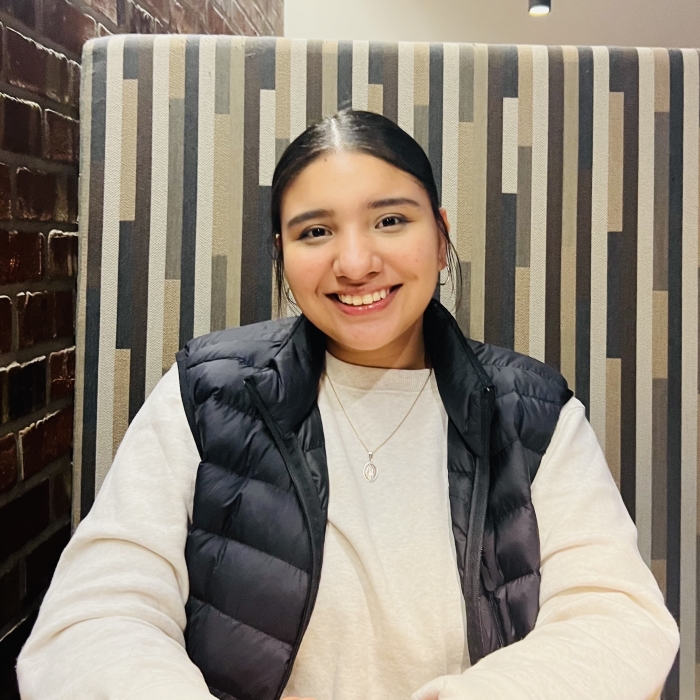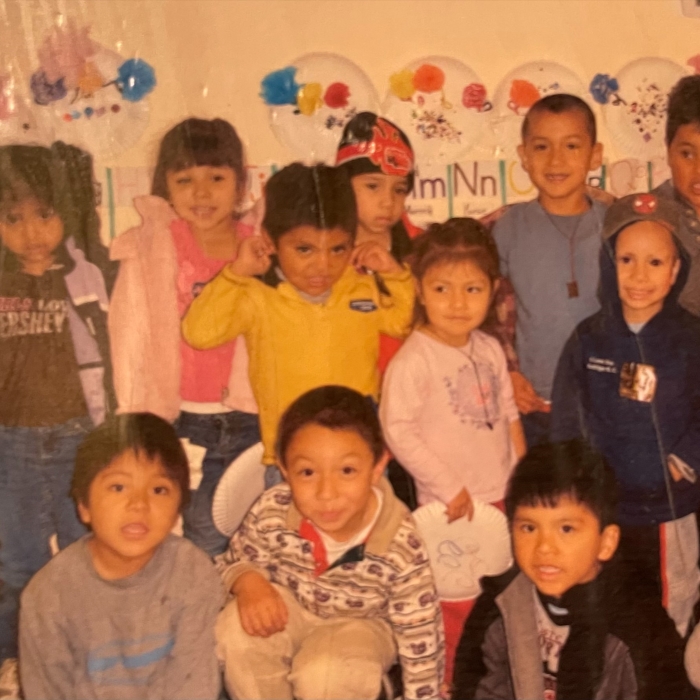Fall 2022
She Persisted
Through the Moreau Center's Interns for Justice program, Anaís Larios-Maldonado '24 returned to the Oregon Child Development Coalition, a program she'd attended as a child.
- Story by Anaís Larios-Maldonado

Anaís Larios-Maldonado

Anaís (top row, second from left) with her four- and five-year-old classmates from OCDC.
HARVESTING SEASON MEANT being awake before dawn, sitting in a car, head against the cold window, listening to the radio broadcaster dandondole a mi gente ánimos, cheering my people on for the day ahead of them, working under the hot sun with a picking bag around their shoulders. Before work mi amá would drop me off with Eufrasia, who had taken care of me since I was three months old. I was with her until I was old enough to put the picking bag over my shoulders.
But one morning, mi amá took me somewhere that wasn’t Eufrasia’s living room. I was probably confused and scared, and I remember hiding behind her, crying, holding onto her very tightly. La maestra Quina, of Oregon Child Development Coalition, walked over to tell me everything was okay.
My memories of OCDC are a little foggy, but I’m sure that everything that day was, indeed, okay. We’d sing “Elena la Ballena,” ride bright red tricycles around the playground, run over to the fence that divided OCDC and Mid Valley Elementary at recess to say hi to older siblings, and have field trips such as eating Estela’s quesadillas from La Taqueria Los Tres Amigos across the street and feed los patos down the block by the ACE Hardware store.
When we all got to elementary school, there were new children who didn’t look like us and couldn’t understand us. There were teachers who spoke Spanish differently from us and taught us songs we had never heard before. But we had each other. We shared a language, a culture, and struggled to fit in.
I had the great privilege of returning to OCDC as a Family Advocate this summer, as part of my Interns for Justice program through UP’s Moreau Center for Service and Justice. As Family Advocates, we focused on ensuring that our students were safe and healthy. Because our counties were at high risk for COVID cases, we got health referrals from teachers every day, checked the students’ temperatures, and communicated their symptoms with parents. We normally had a medical provider on site to examine children who were feeling ill. We worked directly with them to translate for families, provide cultural context to providers, and make the children feel safe and comfortable. We also worked from Monday to Saturday, as early as 4 a.m., to help the families escape the heat.
Returning to OCDC was powerful for me; the experience demonstrated that their goal of setting children up for success was far from just a dream. We were heard, we were supported, and most importantly, we were given a space to be ourselves and embrace who we were. We were all migrant children with dreams to fly high. After OCDC, we faced inequity and discrimination in an education system that forced us to abandon our culture and language, but we persisted. Now, I am here.
Anaís Larios-Maldonado ’24 is a secondary education and Spanish major.
More Stories
A Reading Room of Her Own
How an early struggle with words—along with two heroic reading specialists—paved the way for a young educator’s teaching philosophy.
- Story by Claire Breiholz